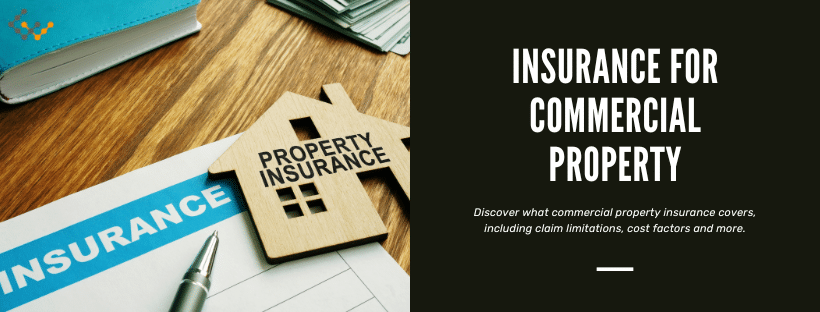Insurance for Commercial Property: What’s Covered and What’s Not?

Any investment in commercial property is a significant one, and even the most well-managed properties suffer damage. Commercial insurance is a necessary investment, yet many investors don’t know much about their coverage nor how to take full advantage of the protections it provides.
What is Commercial Property Insurance?
Commercial property insurance is much like any other form of insurance. It is a policy taken out to provide financial protection to the property owner should a covered peril, such as a fire, cause damage. Owners and those leasing property should consider the value of this type of insurance, and appropriate policies can offer the protections needed.
Commercial insurance policies provide protection for actual, physical assets from unavoidable, accidental damage. This includes events like vandalism, fires, theft, and wind damage. Most commercial properties do not provide outright protection for flooding or earthquakes, but these can be supplemental additions to most policies. Property owners should select coverage based on the following:
- The type of property
- The use of that property
- The features and structures of the property
- The risks to that property
- The value of rebuilding or replacing the property
- Coverage of all physical structures for the property, from commercial signage to storage units
Types of Insurance for a Commercial Property
All property insurance should be customized to meet the specific needs of that property owner and the risks associated with the real estate or other assets. Some of the most basic broad terms for this coverage include:
- Building insurance: this typically includes the structure itself as well as any permanently installed equipment, fixtures inside and out, and all additions to the property, such as added spaces.
- Business personal property insurance: This component of a commercial property insurance policy typically includes the valuable assets on the property that are a part of the business’s function and commonly stored there, such as machinery, furniture, electronics, and furniture.
Within this, there are numerous specific types of insurance available that can help to enhance policies, such as:
- Flood insurance
- Earthquake insurance
- Nuclear hazard coverage
- Business income insurance
- Equipment failure insurance
Insurance policies may also be customized to fit the specific needs of the property. A marine property insurance policy for a business may be different than that of an apartment complex, for example.
What Does Commercial Property Insurance Typically Cover?
While this depends on the type of insurance policy selected, commercial property insurance typically covers losses to the structure or other covered property, including from perils such as:
- Lightning
- Hail
- Fires
- Theft
- Vehicle damage
- Civil commotion
- Smoke damage
- Explosions
- Vandalism
- Falling objects
What Claims are Not Covered by Commercial Property Insurance?
Commercial insurance policies may be available in two basic forms:
- Some policies cover everything except what is specifically listed on the policy. These are called exclusions, and they are specifically defined by the policy.
- Some policies cover nothing but what is specifically written into the policy. If something occurs that is not listed on the policy, the loss or claim is not covered.
Typically, commercial property insurance will not provide coverage for claims such as:
- Flooding
- Intentional damage
- Acts of war
- Terrorism-related hazards
- Normal wear and tear
These policies are typically aimed at providing coverage for risks that are unpreventable or unavoidable in some way. It is not possible to protect an asset from all risks associated with fire, for example. However, intentionally damaging the property is never covered.
How Much Does Commercial Property Insurance Cost?
The cost of commercial property insurance is dependent on numerous factors. Each policy must be customized based on core factors related to the structure and assets. To determine the cost, insurance companies will use a range of information to assign risk and determine insurance costs. Some of those factors may include:
- The type of property: A high-risk property, for example, a bar, is likely to cost more to insurance than an office space simply because there is more risk.
- Structural design and costs: In selecting the policy, the owner should consider the cost to rebuild the property if lost, as well as factors like lost income. The policy’s cost, then, is based at least in part on the value of the structure itself.
- Occupancy: Does the property owner occupy the property? If so, that may cost less than if the property is leased simply because an owner is less likely to cause damage to their own property.
- Protections in place: Security systems, fire-safe materials, and other upgrades that enhance the safety of the property may help to reduce overall costs.
- Location: Costs are also dependent in part on the location of the property. Costs differ based on risks, which means high-risk areas where theft and vandalism are higher may cost more to insurance than those in a less risky community.
How Do Insurance Companies Assess the Value of a Destroyed Property?
Policies have a cap, or limit, on the coverage provided for any claim. To determine the value of a claim, the insurance company utilizes the terms and conditions listed in the policy, which can differ.
The process is much like what is used to determine the losses associated with residential property damage. However, the calculation may take longer because commercial properties tend to be more complex with added features and more complex conditions.
The value of a commercial property insurance claim is dependent on several things:
- The total estimated value for the repair or replacement of all damage to the property and the covered contents is estimated.
- Applicable policy limits are then taken into consideration.
- Commercial property owners do not receive compensation for amounts under the deductible.
- Any coinsurance is considered.
- Cash value or replacement cost value
- Value of the commercial property at the time of the incident and loss
One key factor to remember is that the actual value and replacement value components are often very different. Some commercial properties will pay out based on the actual value of the loss. In this situation, the amount paid out is specific to the value of the lost asset at the time of the incident.
For replacement cost coverage, the policy pays out based on the cost of replacing the lost asset with something similar. For example, if an onsite washing machine were lost, an actual cash value policy would pay the value of that washing machine at the time of the loss, which considers its depreciation. With a replacement cost policy, the coverage is based on the cost of buying a new washing machine of similar condition and features.
How to Choose the Best Insurance for Your Commercial Property
Selecting the best insurance for a commercial property focuses on several key things, including choosing an agent that offers insightful information and the willingness to customize a policy to meet the specific needs of that business and the assets within it. It should also include costs associated with the type of property risks.
Wrapping Up
Commercial property insurance is an essential resource for protecting valuable investment property. Without it, the owner would face financial difficulties restructuring after a considerable loss. Policies are customized to fit the needs of that structure, with budgetary factors considered as well.

